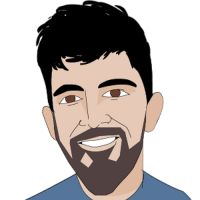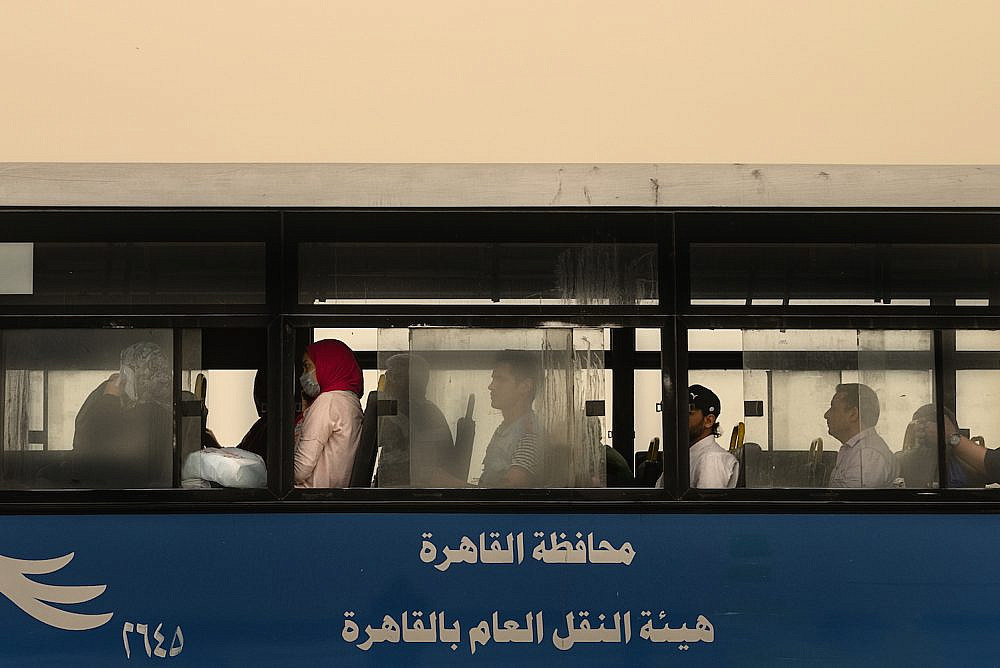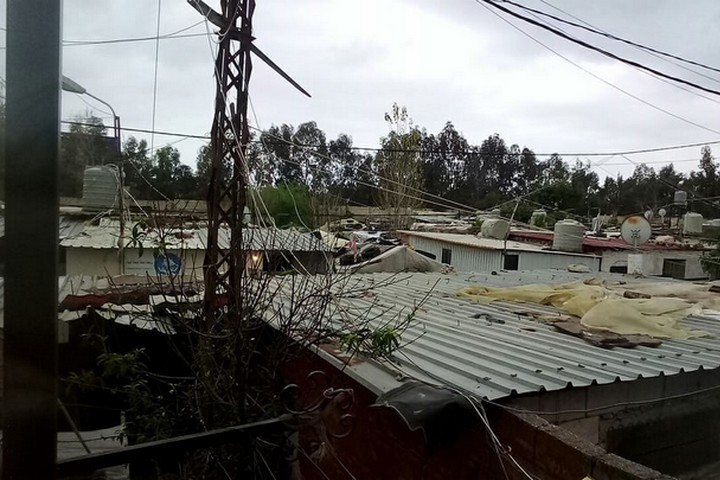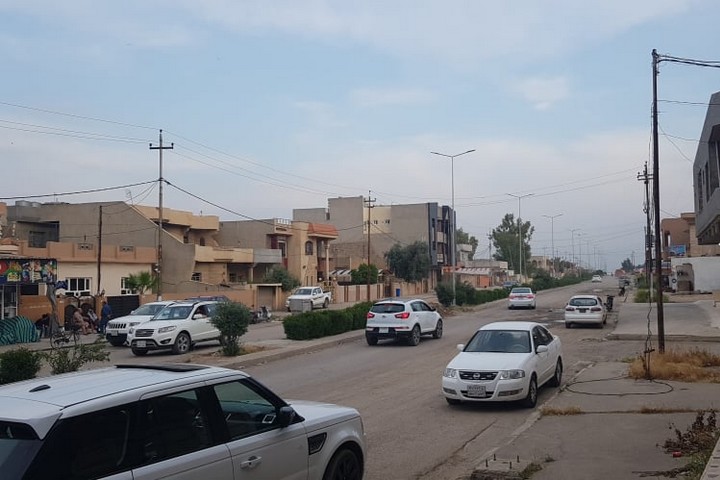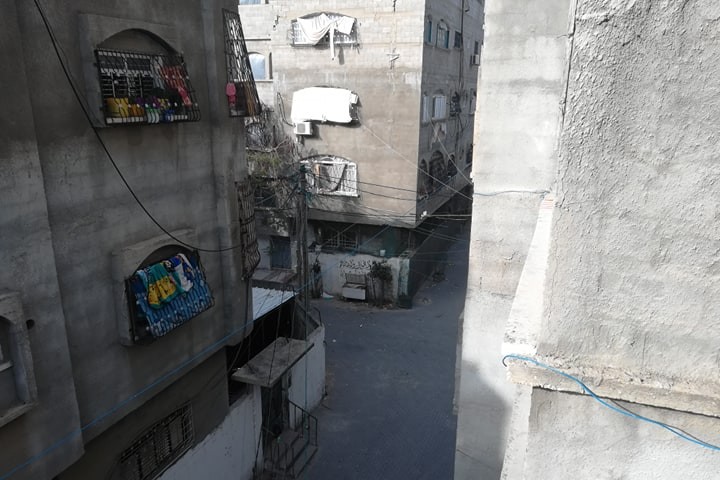Daham Al-Shanabla, Amman, Jordan
Daham, a young journalist, answers the Zoom call from his one-bedroom apartment in Amman. He has a long beard, a “peace” tattoo across his right arm, a cigarette between his lips, and two computers. “The coronavirus has doubled the amount of work,” he tells me.
Five years ago, in the city of Daraa in Syria, his life changed completely. He was riding the bus home from university, where he studied medicine, when Syrian planes bombed the bus, badly wounding him. At age 18, Daham was evacuated to a hospital in Jordan that agreed to treat him. He was given refugee status. His dreams of becoming a doctor were shattered along with his hand.
Five years later, Daham is still recovering. His hand burns at night, but when we speak he is lively and in good spirits. “Now, in quarantine, I have begun to learn to play the melodica. I always dreamt of playing [an instrument], and it’s the only one for which a single hand is enough,” he laughs. “Even for a harmonica you need two hands. I’ve tried.”
Daham is one of 1.8 million Syrian refugees living in Jordan. Most of them live hand-to-mouth, with over 80 percent under the poverty line. Now the situation has grown even worse. Daham, who previously lived in the Zaatari Refugee Camp, was able to establish himself as a journalist from the big city, yet he worries for the friends he left behind.
“The camps haven’t had any coronavirus cases, but the families there are crumbling financially. There is no work, the schools have been shut down, and the children do not have access to the computer and the phone, so they have a hard time with distance learning.”
In order to assist poorer families, the Jordanian government has begun televising classes for children in elementary school. “It’s divided according to hours and grades,” Daham explains. “Everyone in Jordan has a TV at home so it works well.”
Jordan took a number of additional, more severe steps to try and stop the spread of COVID-19 (there are currently 471 confirmed cases, and nine people have died). “The Jordanian army is on every corner [in Amman],” Daham says. “There is a nightly curfew, we cannot drive around, and those who are caught have their cars confiscated. Lawbreakers are also fined 100 dinars ($141). It works well, and now they are starting to talk about going back to normal.”
I tell Daham that judging by his face, he looks much older than 23. “It’s the beard!” he laughs. “There are no barbershops so it is too long. Believe me, without it I look like a child. The barbershops are closed. Almost everything is closed. The person I’ve met the most often this past month has been the cigarette vendor. I’m losing it.”
During his two years in Zaatari, which were the toughest and loneliest in his life, Daham joined a theater troupe and studied acting. “To stand on stage, to communicate with a crowd that needs encouragement — that saved me.” Now those same feelings are beginning to resurface.
“A week ago, I stood in front of the mirror out of loneliness and spoke to myself. Like a crazy person. I had an idea. I invented a character of a crazy man and filmed myself speaking about subjects that pain me such as economic inequality, but in a funny way.”
Shadi, Ein al-Hilweh Refugee Camp, Lebanon
Shadi was born in Ein al-Hilweh, widely referred to as the “capital of Palestinian exile.” The camp is home to hundreds of thousands of Palestinian refugees, most of them hailing from villages, towns, and cities in the Galilee. “My family is from a small village near Safed, not very far from the camp,” Shadi says.
Shadi is a social justice activist who recently celebrated his 30th birthday. Every day, he uploads a video to Facebook in which he updates camp residents about the struggle against the coronavirus while harshly condemning both UNRWA, the UN agency tasked with providing assistance and protection to Palestinian refugees, and the Lebanese government.
“The economy has ground to a halt and people are reeling economically,” he continues. “Had I belonged to Fatah or Hamas, UNRWA would have helped me. But because I am not part of any organization, like most residents of the camp, no one gives me the time of day. The clerks in UNRWA, which is supposed to be an objective organization, all belong to a political organization and they only help their own. They are corrupt.”
The Lebanese government denies the majority of Palestinian refugees from obtaining citizenship, as well as access to health services and public education. It also bars them from working in various occupations, Shadi tells me. “It is total oppression.”
Two years ago, Shadi established a non-partisan humanitarian organization for Ein al-Hilweh’s residents. “We raised funds and helped pave roads and organize sports days for teenagers,” he tells me. Yet in the shadow of the coronavirus crisis, his organization began to come apart at the seams. “We couldn’t raise funds because people ran out of money. Now we, the organization managers, are in need of help.”
Residents of Ein al-Hilweh continue to depend on Shadi’s help. “Since the coronavirus began, my phone has been flooded with messages. Most of the people want medicine or food. Everyone here is unemployed and has no income. It is hard for me to reject them. People are scavenging for leftovers from the vegetable vendor.”
The camp is divided according to villages of origin that were destroyed in 1948: Saffuriya, al-Manshiyeh, Safsaf, Hittin, and others. Shadi sends a photo from his window, which overlooks the neighborhood in which he grew up. The view is ugly, he says.
The muezzin’s call to prayer can be heard over Zoom, but Shadi says that no one is going to the mosques to pray. I ask what it was like to grow up in the camp. “I’ll describe it to you briefly, since I don’t have much internet,” he laughs. “It’s like Gaza: dense, poor, crowded. Only worse. In Gaza they are oppressed but at least they live in their homeland. Here you are oppressed, but you live in a foreign country.”
Over and over, Shadi expresses helplessness and anger at the powerful forces that have controlled his fate. Those who forced his family into exile and dispersed them across the world; the corrupt Palestinian factions that do not represent him; UNRWA, which fails at its job; and the Lebanese government, which refuses to grant Palestinian refugees citizenship and equal rights.
Shadi’s internet starts to cut out. Yalla, I need to go, he says. Before he does, I ask: what’s the most important thing for you? What is most urgent?
He sits silently for a moment, and just before hanging up, he responds: “I want to be seen.”
Neamat Muhammad, Alexandria, Egypt
Ever since Neamat’s father passed away, she has been living with her mother in Alexandria. Both worked hard in their full-time jobs but are now unemployed. “We are stuck in the living room all day,” she says wearily. “I miss my friends.”
According to Facebook, Neamat and I have something in common: both of us follow the Academy of the Hebrew Language. She laughs when I mention it. “I studied Hebrew at university in Cairo.”
In 2013, when no one wanted to visit the city following the Arab Spring, Neamat decided to study tourism. “The university asked us to choose a language from a list of 16 languages,” he says. “At the time, no one wanted to study Hebrew because tourists from Israel were not coming. I thought to myself: walla, there are no students, the class will be small — it will be nice.”
That turned out to be a mistake. Neamat, who learned to speak fluent Hebrew, was stuck for three years with an unusable language and no job. The Israelis did not begin returning to Egypt until last year.
And then the pandemic struck.
“Tourism here has crashed,” Neamat says. “By the time there was a feeling that we were finally past the consequences of the Arab Spring, everything was destroyed once again.” Egypt’s tourism industry flourished in 2019, with profits increasing by 28 percent compared to the previous year, and with an uptick in the number of tourists that nearly rivaled the number in the days right before the Egyptian revolution.
“I am most afraid of the summer months,” Neamat tells me. “Will the airports resume work? Will tourists be brave enough to come back here?”
Egypt is home to 100 million people, the largest in the Middle East. The government has reported 7,201 cases of COVID-19 and 452 deaths. But due to a lack of tests and a lack of transparency, those numbers are difficult to verify. Egypt is one of the biggest jailers of journalists in the world; according to reports, a number of reporters were arrested in May after they challenged the official coronavirus statistics published by the government.
I asked Neamat to photograph the view from the window of her living room. She laughs. If you insist on seeing Egypt in the midst of a crisis, she says, you’re better off visiting the Ministry of Tourism website, which recently began allowing visitors the opportunity to visit the country’s sites from their own homes.
Jameel al-Jameel, Bakhdida, Iraq
Jameel’s Facebook profile picture shows him standing on a stage with his eyes closed and a piece of masking tape covering his mouth. “This photo was taken at memorial ceremony for the genocide against the Christians of Iraq,” he says. “I put on the tape, went on stage, stood for a minute, and stepped off — without saying a word. My shirt had a list of all the massacres we have faced over the last hundred years, starting in 1915 under the Ottoman Empire and ending in the 2014 massacre by ISIS.”
Jameel is a poet, journalist, and social activist who lives in a Christian town named Bakhdida in northern Iraq, not far from the city of Mosul. Various Christian sects in Iraq have faced oppression and subjugation for decades. “The violence I endured has shaped me. The poverty, the betrayals, the hatred. All of this eventually turned me into a social justice activist, and strangely into an optimist.”
Jameel sent me a close-up of his scarred face “This is from 2010,” he says. “My face was destroyed. I was on my way to university in Mosul with a group of Christian students. Al-Qaeda planted a bomb and my face was burned as a result.”
Jameel is part of the younger, politically-minded generation, which openly rails against the sectarian and religious divisions in Iraq that for years have fueled conflicts in the country. As opposed to his parents’ generation, he defines himself as simply Christian, rather than Assyrian-Christian.
Like in many other places in the world, the coronavirus has brought studies across Iraq to a halt, stores have closed down, movement between has been restricted, and residents have been instructed to remain at home. The damage, Jameel says, has first and foremost been economic and psychological. “Life has come to a complete standstill. As a journalist, I received permission to go outside. I took advantage of that to speak to families and see what they needed.”
Jameel has gathered around him a number of volunteers, and together they have provided support to needy families who have become impoverished. “Over the last month, we have distributed food and medicine to over 600 families of all backgrounds,” Jameel says. “We have gathered donations from Christians living outside Iraq. Most of the Christian community lives in the diaspora.”
“Many of our residents suffer from psychological problems,” he adds, “particularly women. There are families that have been broken apart due to economic problems, there have been many divorces, and unfortunately there has been an increase in violence against women.”
Jameel believes in promoting an all-encompassing Iraqi national identity that will bring together all ethnicities and religious groups in the country. The fight against the coronavirus has reinforced this national sentiment, which he says has been increasing in recent years, particularly among young and urban Iraqis.
“A sense of solidarity and shared fate has been felt across the country,” he says. “After all, the virus affects all of us — regardless of religion or sect. Iraqi nationalism has strengthened. The coronavirus is our opportunity to re-connect to our humanity, to a feeling that builds bridges rather than walls.”
Sana, Gaza Strip
Sana laughs the entire time we speak. Even when she speaks about difficult subjects with brutal honestly, she makes sure to talk about them with a joke. “I am the kind of person who looks on at the world from the outside,” she says, “and that is because I write a lot. I studied literature in university.”
Sana’s family is originally from a small village inside present-day Israel that was destroyed in the 1948 war, located only 30 kilometers from the refugee camp she was born in. “I don’t want to frighten you, but it is well known that people from my village have a temper — so watch out!” she threatens and laughs.
Over the past month, Sana has worked strictly from home. “My immune system is not good and I’m a bit of a worrier, so I decided not to leave the house. Many people in Gaza work from home but no one is forcing them to do so because the authorities have not shut down the economy. People are still working outside their homes.”
Sana says that Gaza’s Health Ministry is working under the assumption that the blockade on the strip is enough to isolate all those who have come from abroad. “Hamas opened up a number of isolation centers and for now it is working. We don’t have cases of coronavirus outside those centers.”
Compared to other governments in the region, Hamas has taken minimal steps in response to the virus: no closure or curfew has been imposed and the economy has only partially been shut down. Sana says the authorities have closed the mosques and schools and, most dramatically, forbidden entry to the promenade along the sea. “This is the only place you can breathe under the closure, and yet I still see photos on Instagram of people at the beach. How do they do it? I do not know.” She laughs.
Today, when she left her house for the first time and walked around the refugee camp, the streets were exceptionally lively. “Businesses were open, and life went on, almost as if things are normal.”
I ask Sana what life was like under quarantine. She says she spends time with her brother’s children, who live on the floor above. “They are nine and 10, and the time spent with them has caused me to think a lot. I thought about how fast they grew up here. Too fast.”
I ask what she meant by that. “In the last war, my brother told the children that the noise of the shelling was actually people throwing chocolate, and he said here, take it, I brought you chocolate. But I refused to lie to them. I told them about the shelling because I love them, because I knew they needed to grow up fast, otherwise the reality would hit them. That’s how I grew up, that’s how we all grew up here.”
“I’ll tell you something,” she continues. “I’m not afraid of shelling. I don’t shake, my heart never beats. On the contrary — I often burst out laughing.”
“And not only that. When we are bombed, if a friend next to me cries, screams, asks to go home, I feel… it’s hard for me to describe it, it’s as if I blame her, angrily, like, she has no right to be afraid! Can you believe it? It’s not enough that I am apathetic toward myself, I’m not able to be there for others when they are afraid.”
“And I’ve been thinking about it a lot lately,” she continues, “I don’t know how to deal with it. It’s not healthy, is it? It bothers me. People I know are dead, whole families, and I don’t feel anything. Now, if you show me a kitschy movie or read me a touching sentence, I will cry straight away. But my reality — it doesn’t affect me.”
Should write all this? I ask. She nods. “People always think that we… that the injury is physical. I want them to know that the injury, for me, is mental. I’ve survived three wars and I’m still a human being. But what kind of person am I? I’m devastated inside and I don’t know how to fix myself.”
Then she stops, looks up, laughs again. “I am very sorry that you interviewed me and had to hear these things. That I passed on all this negative energy to you.” No, I say. You said things that were difficult, but you’re full of good energy. “I don’t know,” she says, “maybe.”
Before we hang up she asks that we chose a pseudonym for her. It is clear to both of us that there is nothing self-evident about having this conversation, at least as long as my people keep her people under siege. Which name should we choose? I ask. “I have an idea,” she responds, “now that we know each other, think about my qualities that stood out, and it will likely inspire you.”
Sana, her pseudonym, means “a light in the dark.”
The weight of crossing borders
The scenario of mass infection and an enormous death toll — as we are currently witnessing in the U.S. — has yet to be seen in any Arab country. However, the economic implications are already felt and are equally dangerous. According to the UN, one million people in the Arab world will fall below the poverty line this year due to the COVID-19 crisis.
Beyond the economic crisis, the journey between Iraq and Egypt overwhelms me with all kinds of thoughts about borders. How easy they are to traverse virtually, and how difficult, how painful, they are to cross emotionally and politically.
The emotional and political dimensions of the border are intertwined. It is impossible to push a person beyond a political border without pushing him beyond an emotional boundary — without dehumanizing him or her. The opposite is true: when an emotional border is truly breached, the political boundary that guards it also cracks.
The conversations I conducted challenged my emotional boundaries. I had never before spoken to someone like Shadi, a Palestinian refugee from Lebanon. He is part of a group that is pushed out of my consciousness, outside the boundaries of my emotions. And suddenly he appears as a person — full of life and love and humanity — and undermines what I have suppressed. It is a strange moment, as it also forces one to come to terms with a political border that was always transparent.
In Israel-Palestine, rethinking the political border means a bi-national state for both peoples. A place in which Sana, who has never before left the Gaza Strip, can study abroad, travel across the country, live in Jerusalem, and even rebuild the village from which her family came. A place that will be home to Jews and Palestinians alike.
Many dismiss these thoughts as a naïve, unfeasible pipe dream. I would not rush to write them off so quickly. If there is anything encouraging in the current crisis, it is the proof that humans have the ability to quickly adapt to radical changes. What is deemed impossible today becomes tomorrow’s new normal.
This article was first published in Hebrew on Local Call. Read it here.

